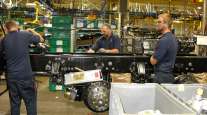Class 8 Truck Orders Soar
This story appears in the June 13 print edition of Transport Topics.
Orders for new Class 8 trucks in North America jumped 85% in May compared with a year ago, and manufacturers said component shortages — particularly axles and tires — were affecting output.
Two research firms that follow truck production reported that Class 8 orders this year have gained more than 165% from 2010 levels. And they reported that results for May were strong, but they trailed April, when a five-year high was recorded.
ACT Research Co. reported 24,400 new heavy-duty vehicles were ordered, up from 13,210 in May 2010, and FTR Associates said that it counted 24,063 new orders, up from 12,999 last year.
ACT, Columbus, Ind., said the cumulative order total through May was 143,034, up 166% from the same period last year. FTR, Nashville, Ind., counted nearly 142,000 new orders, up 169% over last year.
Both firms reported about a 38% drop from April orders, which had been the highest level since March 2006.
Despite that decrease, “We’re looking at overall still-healthy levels in orders and build,” Eric Starks, FTR president, told Transport Topics.
“We did increase our projection for Class 8 manufacturing this year in early May to 258,000, for all North America and for export, up from 240,000, which is significant,” Starks said.
Starks and Steve Tam, vice president for the commercial sector at ACT, said “replacement” rather than expansion was the main reason for the growing orders.
On June 9, Daimler Trucks North America said it plans to hire about 1,400 new employees this year in the United States and Mexico to meet increased demand for its Freightliner and Western Star trucks.
In the United States, employees will be added at plants in Holly and Gastonia, N.C., as well as in Portland, Ore.
DTNA said it will also add more workers for a third shift in Saltillo, Mexico, where the Cascadia model is built.
“The Class 8 market continues to look very strong for replacement purchases in our core business, the over-the-road segment,” David Hames, DTNA’s general manager, marketing and strategy, told TT before the announcement.
Hames said that commodities such as “rubber, copper, aluminum and iron are subject to global demand from fast-growing markets like China and Brazil and are impacting manufacturing in our industry in terms of supply constraints and material costs.”
Navistar Inc. spokesman Roy Wiley said that components also were a problem. Navistar makes International trucks.
“The main constraint on production is the inability to get components, with axles and tires especially tight,” Wiley told TT. “I think everyone in the industry is feeling that, especially for those two components.”
“The order rate earlier in the year was much higher than anyone expected, and we didn’t think it could continue for the rest of this year,” Wiley said.
“We have seen the pace of new truck orders continue to improve in our market,” Kyle Treadway, president of Kenworth Sales Co., West Valley City, Utah, told TT. Kenworth Sales operates 18 locations in Mountain and Western states.
“They are almost universally for replacement and without regard to fleet size,” said Treadway, who is also chairman of American Truck Dealers, a division of the National Automobile Dealers Association.
“Our customers are in a corner because their repair costs are growing and the price of new equipment is not declining,” Treadway said. “Faced with economic realities, they are buying the minimum necessary to keep their thin operating margins under control.”
“It appears that order intake has dropped off a bit,” said Fred Grask, general manager of Cedar Rapids Truck Center, a Peterbilt dealer in Cedar Rapids, Iowa. “I’m not sure what the rationale is. In our case, we have seen Peterbilt raise prices, which they attribute to increasing costs of raw materials, and I think that price increase slowed things up for us.”
Peterbilt has only a small number of available build slots for the rest of this year, Grask said.
Frank Ellett, president of Virginia Truck Center Inc., Roanoke, Va., sells mainly Freightliners.
“It’s just a choppy marketplace right now, and that’s the only way I can describe it,” Ellett, Freightliner’s board member on ATD, told TT. “Really, Freightliner can’t build any more of its premium Class 8s to the end of the year, and that’s added to the choppiness.”
Jim Hartman, principal for Truck Enterprises, Harrisonburg, Va., is a dealer for Kenworth trucks and Volvo Trucks North America.
“We are seeing that orders for Class 8 have slowed,” Hartman told TT. “It appears that customers are concerned because the economy is so volatile, and fuel, while it has recently come down in price, is still expensive. I think a lot of customers who think they can get by with the equipment they already have will do so until their assurance level is increased.”



